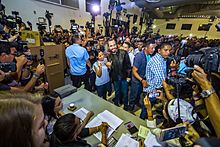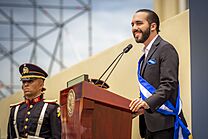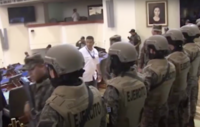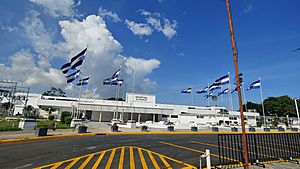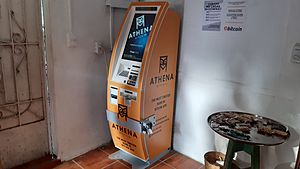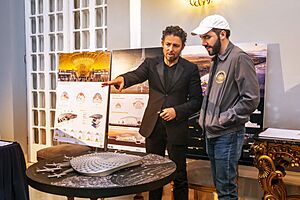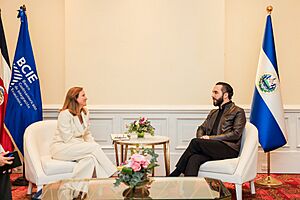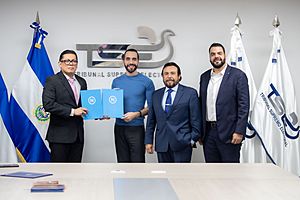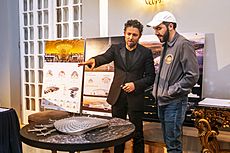Nayib Bukele facts for kids
Quick facts for kids
Nayib Bukele
|
|
|---|---|
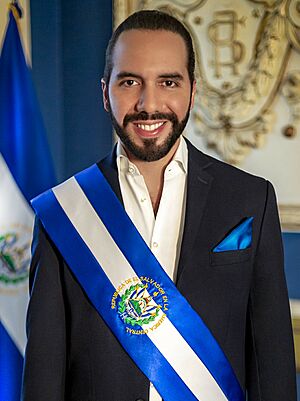
Official portrait, 2019
|
|
| 81st President of El Salvador | |
| Assumed office 1 June 2019 |
|
| Vice President | Félix Ulloa |
| Preceded by | Salvador Sánchez Cerén |
| Mayor of San Salvador | |
| In office 1 May 2015 – 30 April 2018 |
|
| Preceded by | Norman Quijano |
| Succeeded by | Ernesto Muyshondt |
| Mayor of Nuevo Cuscatlán | |
| In office 1 May 2012 – 30 April 2015 |
|
| Preceded by | Álvaro Rodríguez |
| Succeeded by | Michelle Sol |
| Personal details | |
| Born |
Nayib Armando Bukele Ortez
24 July 1981 San Salvador, El Salvador |
| Political party | Nuevas Ideas (since 2017) |
| Other political affiliations |
|
| Spouse |
Gabriela Rodríguez
(m. 2014) |
| Children | 2 |
| Parent |
|
| Education | Central American University (no degree) |
| Occupation | Politician, businessman |
| Cabinet | Cabinet of Nayib Bukele |
| Signature | |
Nayib Armando Bukele Ortez (Spanish: [naˈʝiβ buˈkele]; born 24 July 1981) is a Salvadoran politician and businessman who has been the 81st and current president of El Salvador since 1 June 2019.
Bukele established an advertising company in 1999 and worked at an advertising company owned by his father, Armando Bukele Kattán; both companies advertised election campaigns for the Farabundo Martí National Liberation Front (FMLN) political party. Bukele entered politics in 2011; the following year, he joined the FMLN and was elected mayor of Nuevo Cuscatlán. Bukele served until his 2015 election as mayor of San Salvador, where he served until 2018. In 2017, Bukele was ousted from the FMLN; he founded the Nuevas Ideas political party shortly afterward and pursued a presidential campaign in 2019. After the Supreme Electoral Court (TSE) refused to register his party, Bukele ran for president with the Grand Alliance for National Unity (GANA) and won with 53 percent of the vote.
Bukele implemented the Territorial Control Plan in July 2019 to reduce El Salvador's 2019 homicide rate of 38 per 100,000 people. Homicides fell by 50 percent during Bukele's first year in office following a trending decline that began in 2016; Bukele attributed the homicide decrease to the plan. Digital news outlet El Faro and the United States Department of State accused Bukele's government of secretly negotiating with gangs to reduce the homicide rate. After 87 people were killed by gangs over one weekend in March 2022, Bukele initiated a nationwide crackdown on gangs resulting in the arrests of over 83,900 people with alleged gang affiliations by December 2024. The country's homicide rate decreased to 1.9 homicides per 100,000 in 2024, one of the lowest in the Americas. Bukele passed a law in 2021 that made bitcoin legal tender in El Salvador and has promoted plans to build Bitcoin City. In June 2023, the Legislative Assembly approved Bukele's proposals to reduce the number of municipalities from 262 to 44 and the number of seats in the legislature from 84 to 60. He ran for re-election in the 2024 presidential election and won with 85 percent of the vote after the Supreme Court reinterpreted the constitution's ban on consecutive re-election.
Politicians, activists, and journalists have accused Bukele of authoritarian and autocratic governance. In February 2020, Bukele ordered 40 soldiers into the Legislative Assembly building to intimidate lawmakers into approving a US$109 million loan for the Territorial Control Plan. After Nuevas Ideas won a supermajority in the 2021 legislative election, Bukele's allies in the legislature voted to replace the attorney general and all five justices of the Supreme Court of Justice's Constitutional Chamber. Bukele has attacked journalists and news outlets on social media and has drawn allegations of censoring the press. Before Bukele's presidency, he considered himself a member of the radical left, but Bukele has since not identified with any political ideology; political analysts have described him as a populist and a conservative. Bukele has high job approval ratings in El Salvador and is popular throughout Latin America.
Contents
Early life
Nayib Armando Bukele Ortez was born on 24 July 1981 in San Salvador, El Salvador. His father was Armando Bukele Kattán, a businessman and industrial chemist, and his mother is Olga Marina Ortez; Bukele's father died in 2015. Bukele was the couple's first child. He has three younger brothers: Karim, Yusef, and Ibrajim. He also has four half-sisters and two half-brothers from his father's side of the family. Bukele's father converted to Islam from Christianity in the 1980s, became an imam, and founded four mosques in El Salvador; Bukele's mother is a Roman Catholic. Bukele's paternal grandparents were Palestinian Christians who immigrated to El Salvador from Jerusalem and Bethlehem in 1921; Bukele's maternal grandfather was a Greek Orthodox and his maternal grandmother was a Roman Catholic.
Bukele completed his secondary education from the Escuela Panamericana in 1999 at the age of 18. He enrolled at the Central American University in San Salvador to study judicial sciences with aspirations to become a lawyer, but he dropped out to work for the Nölck advertising agency, one of his father's businesses. Nölck campaigned for the Farabundo Martí National Liberation Front (FMLN), a left-wing Salvadoran political party.
In 1999, Bukele founded Obermet, S.A. de C.V. (also known as 4am Saatchi & Saatchi El Salvador), a marketing company. He served as its president from 1999 to 2006 and again from 2010 to 2012. This company ran political advertising for the FMLN presidential campaigns of Schafik Hándal in 2004 and Mauricio Funes in 2009. From 2005 to 2007, Bukele was the president of CLS, a company which issued Salvadoran passports. From 2006 to 2010, Bukele was the president of Nölck, for which he previously worked for. From 2009 to 2012, Bukele was the president of Yamaha Motors El Salvador, a company that sells and distributes Yamaha products in El Salvador. During Bukele's career as a businessman, he described himself as a "businessman with a great future" ("empresario con gran futuro").
Early political career
Mayor of Nuevo Cuscatlán
On 11 March 2012, he was elected mayor of Nuevo Cuscatlán, in the department of La Libertad, representing a coalition of the Farabundo Martí National Liberation Front (FMLN) with 2,754 votes (49.72%) and Democratic Change (CD) with 108 votes (1.95%), for a total of 2,862 votes (50.68%), defeating the incumbent Nationalist Republican Alliance (ARENA), which won 2,585 votes (46.67%). He took office on 1 May 2012.
During his term, he donated his salary to the scholarships that he was offering for youths in Nuevo Cuscatlán. On 21 January 2015, Bukele inaugurated a new boulevard which connected Nuevo Cuscatlán with Huizúcar and Antiguo Cuscatlán. Bukele performed much of his works as mayor with funding from ALBA Petróleos, an association owned by the Venezuelan oil company PDVSA.
Mayor of San Salvador
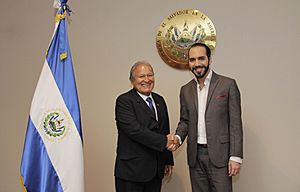
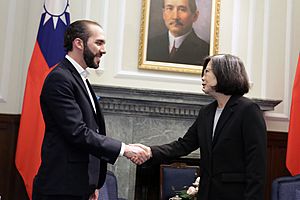
In the municipal elections of 2015, he won the mayoralty of San Salvador, the capital city of El Salvador, representing a coalition of the FMLN and the Salvadoran Progressive Party (PSP) that won 89,164 votes (50.37% of total). His main challenger, businessman and former ARENA deputy Edwin Zamora in a coalition with the National Coalition Party (PCN), received only 82,288 votes (46.49%). The latter party had controlled the city during the previous six years. Bukele took office on 1 May 2015.
Upon taking office, Bukele reverted the names of two streets in San Salvador: Calle Mayor Roberto D'Aubuisson to Calle San Antonio Abad A La Vía and Boulevard Coronel José Arturo Castellanos to Boulevard Venezuela. Both names were changed by his predecessor, Norman Quijano, during his term, the former being named after Major Roberto D'Aubuisson, who ordered the assassination of Archbishop Óscar Romero in 1980 during the Salvadoran Civil War and founded ARENA in 1981, and the latter being named after Colonel José Castellanos Contreras, who saved 40,000 Jews from the Holocaust in Central Europe by providing them fake Salvadoran passports. Bukele began his "revitalization" of San Salvador with the relocation of street sellers, a change which was positively received by the public and the media. He also built the Cuscatlán Market and San Salvador's first municipal library.
In February 2017, Bukele visited Taipei, the capital of Taiwan, and met Taiwanese President Tsai Ing-wen to "enhance" the sister city relationship between San Salvador and Taipei. In February 2018, he attended the 32nd International Mayors Conference in Jerusalem, where he was seen praying at the Western Wall, and revealed that his wife's grandfather was a Sephardic Jew. During the last months of his term, Bukele brushed up the historic center of San Salvador by expanding roads, remodeling buildings, and rebuilding electric and telecommunication lines, all costing around $5.7 million.
Expulsion from the FMLN
On 10 October 2017, Bukele was expelled from the FMLN, accused by the FMLN Ethics Tribunal of promoting internal division within the party, verbally and physically attacking fellow party member Xóchitl Marchelli, performing defamatory acts against the political party, and heavily attacking and criticizing incumbent FMLN President Salvador Sánchez Cerén. Bukele did not attend the hearing scheduled for 7 October 2017 by the FMLN Ethics Tribunal, arguing that they were biased in favor of the plaintiffs. The FMLN lost 20 municipalities and 8 seats in the Legislative Assembly in the subsequent 2018 legislative election. Some political experts have speculated that the losses were in part due to the expulsion of Bukele from the FMLN.
Election as president
After Bukele's expulsion from the FMLN, his aspirations towards 2019 moved in the direction of participating in the presidential elections as an independent who rejects the current political system. He had wanted to run for president as a member of the FMLN; however, resistance from party leadership prevented him from doing so. He established the political party Nuevas Ideas ("New Ideas") with the goal of making it a political party where he could run as a candidate for the presidency of El Salvador.
Following the announcement of his presidential aspirations, he was opposed by both the ruling FMLN party on the political left, and ARENA on the political right, as they blocked any attempts for him to found his own political party and politically canceled any party that he has attempted to use for his candidacy, as they did so with Democratic Change. His attempt to run with the party ended when the Supreme Electoral Court (TSE) effectively dissolved the party. Bukele eventually joined the center-right Grand Alliance for National Unity (GANA) party to mount his presidential bid.
On 3 February 2019, Bukele announced that he had won the presidential elections with ease. Challengers Carlos Calleja of the ARENA and Hugo Martínez of the FMLN conceded defeat. He won 53 percent of the vote, thereby eliminating the need for a run-off election. He is the first candidate to win the presidency since the end of the Salvadoran Civil War who did not represent either of the major two parties. In his victory speech he declared, "Today we have turned the page on the postwar period".
Presidency
Inaugurations
Bukele's first presidential inauguration was held on 1 June 2019. He became the 81st president of El Salvador as well as the country's youngest president at the age of 37. Bukele held the inauguration ceremony at the National Palace due to its location in Gerardo Barrios Plaza (renovated by Bukele as mayor of San Salvador) instead of in the Blue Room (meeting room) of the Legislative Assembly in an effort to portray himself as focusing his presidency on the people. Bukele's supporters booed and jeered at the Legislative Assembly deputies as they were introduced. He announced a sixteen-person cabinet composed of eight men and eight women.
Bukele's second presidential inauguration was held on 1 June 2024, again at National Palace. During the inauguration, the Armed Forces of El Salvador (FAES) staged a military parade as a show of force and Bukele wore a Napoleonic-cut jacket with gold trim to evoke the image of Venezuelan liberator Simón Bolívar. He described his second inauguration as "the most important moment in our recent history" ("el momento más importante de nuestra historia reciente").
Political crises
In November 2019, Bukele began trying to secure a $109 million loan from the Central American Bank for Economic Integration to fund phase three of the Territorial Control Plan. The legislature, which was controlled by ARENA and the FMLN, asked him to give them more time to evaluate the loan. On 6 February 2020, Bukele invoked Article 167 of the country's constitution and called for an emergency meeting of the Legislative Assembly to approve the loan. He called for his supporters to rally around the Legislative Assembly during the emergency meeting that was scheduled for 9 February. Although Bukele ordered 40 soldiers into the Legislative Assembly's meeting room on the day of the meeting to coerce legislators into approving the loan, a quorum was not reached and the loan was not approved. Opposition politicians described the crisis as a "self-coup", and it is known in El Salvador as "9F" or "El Bukelazo".
In the 2021 legislative elections, Nuevas Ideas received a supermajority in the Legislative Assembly. On 1 May 2021, Nuevas Ideas formed a coalition government with GANA, the National Coalition Party (PCN), and the Christian Democratic Party (PDC). That day, the coalition voted to remove the five justices of the Supreme Court of Justice's constitutional court and Attorney General Raúl Melara. The justices were replaced by five of Bukele's allies, and Melara was replaced by Rodolfo Delgado. The purge, known in El Salvador as "1M", was described by journalists and opposition politicians as a "self-coup" and a "power grab" and was condemned by the United States.
COVID-19 pandemic
The first case of COVID-19 in El Salvador was confirmed on 19 March 2020. As of 5 January 2023, El Salvador had 201,785 confirmed cases and 4,230 deaths, and as of 16 December 2022, 11,343,183 doses of the vaccine had been administered.
On 21 March 2020, Bukele instated a nationwide lockdown in an effort to combat the COVID-19 pandemic which was to last 30 days. During the lockdown, 4,236 people were arrested by the National Civil Police for violating the lockdown order. Human rights organizations, such as Human Rights Watch, have criticized the arrests. Human Rights Watch also criticized the living conditions of prisoners in El Salvador following Bukele's authorization of the "use of lethal force" by the National Civil Police and the government's release of prisoners being lined up in San Salvador, referring to the living conditions as being "inhumane" and being critical of the move, especially as it was during the COVID-19 pandemic. On 27 May 2020, the United States donated 250 ventilators to El Salvador. During the press conference where Bukele received the ventilators, he stated that he took hydroxychloroquine. On 22 June 2020, Bukele inaugurated the Hospital El Salvador, the largest hospital in Latin America used exclusively for treating cases of COVID-19, having a capacity of 400 beds, 105 intensive care units, 295 intermediate care units, and 240 doctors.
In January 2021, Transparency International cited both El Salvador and Colombia as examples of "an explosion of irregularities and corruption". Transparency International cited the Corruption Perceptions Index of 2020 as its basis. Twenty of Bukele's government institutions were under investigation by the attorney general on suspicions of corruption relating to the pandemic; however, the investigations were halted after the attorney general was removed by the Legislative Assembly on 1 May 2021.
On 13 May 2021, Bukele donated 34,000 doses of the COVID-19 vaccine to several towns and villages in Honduras after pleas from local mayors for vaccines. At the time, El Salvador had received 1.9 million doses, while Honduras had only received 59,000. Bukele donated 44,000 more doses of the COVID-19 vaccine to Honduras on 19 June 2021 after Mexico had donated 154,100 doses to Honduras the day prior.
Economy
Adoption of bitcoin
Bukele announced at the Bitcoin 2021 conference on 5 June 2021 that he would introduce a bill to the Legislative Assembly that would make bitcoin legal tender, saying that it would "generate jobs" and promote "financial inclusion" in the short term. The Legislative Assembly approved the bill three days later. Although the World Bank rejected a request from the Salvadoran government to assist it with the implementation of bitcoin as legal tender, citing concerns about transparency and the environmental effects of bitcoin mining, Athena Bitcoin announced that it would invest $1 million to install 1,500 bitcoin ATMs. This would allow users to exchange U.S. dollars for bitcoin and vice versa.
Bitcoin became legal tender on 7 September 2021 in El Salvador, the first country to do so. It became legal tender alongside the United States dollar, which had been adopted in 2001 and replaced the Salvadoran colón. The day bitcoin became legal tender, its price fell from $52,000 per bitcoin to under $43,000. Apple and Huawei did not offer Chivo, the Salvadoran government-backed digital wallet, on their platforms. About 1,000 people marched in the streets of San Salvador to protest the country's adoption of bitcoin.
The day before bitcoin became legal tender, Bukele announced that the Salvadoran government had bought its first 200 bitcoins. Bukele continued to buy more bitcoins as its price declined in 2021 and 2022, and El Salvador lost up to $56 million by June 2022. Economist Steve Hanke stated that El Salvador had "the most distressed sovereign debt in the world" due to its adoption of bitcoin, and other economists predicted that the country would likely default on its debt. During Bukele's first term, El Salvador was Central America's slowest-growing economy. As the price of bitcoin rose to $44,000 in December 2023, Bukele announced that El Salvador's investment into bitcoin had broken even. In March 2024, he stated that El Salvador had made a 50-percent profit from bitcoin. Bukele mocked news-media outlets on Twitter, saying that there were "literally thousands of articles" about El Salvador's bitcoin losses and the same outlets were now "totally silent". By 19 January 2025, the Salvadoran government had 6,043 bitcoins worth $611.2 million.
In November 2021, Bukele announced that he planned to build Bitcoin City in the southeastern region of La Unión at the base of the Conchagua volcano. The city would use geothermal energy to power bitcoin mining. Ricardo Navarro, head of the Salvadoran Center of Appropriate Technology, criticized the plan, adding that it would result in an "environmental disaster". Bukele published images of models of Bitcoin City and its planned airport on Twitter in May 2022, saying that the city would have "no income tax, zero property tax, no procurement tax, zero city tax, and zero CO2 emissions". In December 2023, the Legislative Assembly passed a law that allowed individuals to purchase Salvadoran citizenship by donating bitcoins to El Salvador.
On 18 December 2024, the International Monetary Fund (IMF) agreed to give El Salvador a $1.4 billion dollar loan in exchange for the Salvadoran government making some concessions from the Bitcoin Law. Concessions included not requiring businesses to accept bitcoin as payment, not accepting bitcoin as tax payments, and reducing the number of bitcoins the government was purchasing. The day after the loan was approved, Stacy Herbert, the director of the National Bitcoin Office, stated that El Salvador would continue to buy bitcoins at an "accelerated rate" ("ritmo acelerado") and the government purchased 11 bitcoins then worth over $1 million in total.
Economic Plan
During Bukele's second inauguration, he stated that his second term would focus on improving the Salvadoran economy with "bitter medicine" ("medicina amarga"). In July 2024, Bukele threatened to mass-arrest vendors, importers, and distributors who engaged in price gouging. Later that month, he announced the beginning of a six-phase Economic Plan ("Plan Económico"). Phase one, known as "Feeding" ("Alimentación"), involved the establishment of 30 food distribution centers and the removal of tariffs on certain agricultural imports for ten years. Phase two, known as "Technology" ("Tecnología") involved the construction of data centers and technological parks in El Salvador. Bukele claimed that his Economic Plan would create 4,000 jobs. Phase three, known as "Logistics" ("Logística"), involved the investment of US$1.6 billion into modernizing the ports of Acajutla and La Unión and the Turkish company Yılport Holdings operating the ports for 50 years.
On 15 September 2024, Bukele stated that his 2025 government budget would not include "a single cent of debt for current spending" ("solo centavo de deuda para gasto corriente") and that his government would not take out foreign loans to pay for the budget. On 16 October, El Salvador and J.P. Morgan & Co. agreed to restructure US$1.03 billion of the country's debt as a part of a debt-for-nature swap, which Bukele described as "reaffirm[ing] this government's commitment to economic growth". In the agreement, El Salvador would allocate US$352 million in savings towards conserving the environment around the Lempa River. On three occasions in 2024, Bukele offered to buy back billions of dollars worth of government bonds due by 2034.
In November 2024, the Central American Bank for Economic Integration announced that it would give the Salvadoran government $646 million to finance infrastructure projects. Bukele stated that the bank's support would help El Salvador's "economic takeoff" ("despegue económico"). Later that month, Bukele wrote on X that he supported mining gold, describing it as "wealth that could transform El Salvador". He further described the country's metal mining ban as "absurd". The Catholic Church, which supported the mining ban's implementation in 2017, called on Bukele to not repeal the ban citing environmental concerns. The Legislative Assembly repealed the ban on 23 December 2024 and Bukele approved the law that same day. Hundreds of Salvadorans protested the ban's repeal.
Foreign policy
Bukele stated in June 2019 that his government would no longer recognize Nicolás Maduro as the president of Venezuela, instead recognizing Juan Guaidó as Venezuela's legitimate president during Venezuela's presidential crisis. On 3 November of that year, he expelled Maduro-appointed Venezuelan diplomats from El Salvador. Bukele considers Maduro to be a dictator. Bukele rejected the results of the 2024 Venezuelan presidential election as a "fraud" ("fraude") and stated that he would not restore relations with Venezuela unless there were "real elections" ("elecciones de verdad").
Bukele refused to recognize the presidency of Manuel Merino in Peru in November 2020, calling Merino's government "putschist" ("golpista"). He and the Legislative Assembly denounced the results of the 2021 Nicaraguan general election, that were seen by several governments as fraudulent. El Salvador has abstained from resolutions critical of Nicaragua at the Organization of American States since 2022, with Bukele's government citing "non-interference" ("no injerencia") as justification. In 2024, El Salvador was the only country to abstain on an OAS resolution to condemn Ecuador for raiding the Mexican embassy in Quito to arrest former Ecuadorian vice president Jorge Glas.
In February 2022, Bukele accused United States president Joe Biden of "crying wolf" about a Russian invasion of Ukraine. Bukele did not comment on the invasion when it began later that month, posting instead on Twitter about bitcoin and bonds. Throughout 2022, El Salvador abstained from votes on United Nations resolutions condemning the Russian invasion of Ukraine. Bukele condemned the 7 October attacks, describing Hamas as "savage beasts" who "do not represent the Palestinians", comparing the group to MS-13. He tweeted that "the best thing that could happen to the Palestinian people is for Hamas to completely disappear".
In March 2024, Bukele offered to send a mission to Haiti to "fix" the country's gang war with United Nations Security Council support. In October 2024, El Salvador agreed to provide soldiers to conduct street patrols and aerial surveillance for the Multinational Security Support Mission in Haiti, and the first Salvadoran soldiers arrived in Port-au-Prince on 3 January 2025.
Relations with the United States
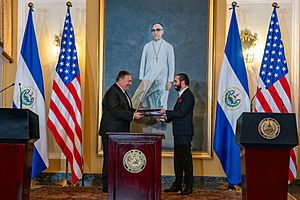
During Bukele's September 2019 meeting with Trump, Bukele called on Trump to promote legal migration in an effort to combat illegal immigration and to maintain the United States' temporary protected status (TPS) policy for Salvadorans living in the United States. The following month, Bukele confirmed that the United States would continue TPS for Salvadorans. In February 2021, Biden refused to meet Bukele when he arrived unannounced in Washington, D.C. to meet him. Bukele did not attend the 9th Summit of the Americas in June 2022 due to frustration with the U.S. government's allegations of corruption and human rights abuses by his government.
Some Democratic Party members have been critical of Bukele's government, and members of the Republican Party have supported him and his policies. Bukele and Norma Torres, a member of the U.S. Congress representing California's 35th congressional district, engaged in an April 2021 argument on Twitter about illegal immigration at the United States' southern border. Torres accused Bukele in November 2022 of interfering in that month's 35th congressional district election by endorsing Republican challenger Mike Cargile. In January 2024, fourteen Democratic members of Congress sent a letter to Biden about Bukele's "authoritarian" actions. Republican congressmen such as Tom Cotton, Matt Gaetz, and Marco Rubio, however, have praised Bukele's policies on crime.
Relations with China
In 2018, El Salvador cut diplomatic ties with Taiwan and recognized the People's Republic of China as China's legitimate government. This led to Bukele and the United States accusing China of interfering in Salvadoran and Latin American politics. Despite Bukele's criticism of China before becoming president, Vice President Félix Ulloa stated in May 2019 that Bukele's government would not restore diplomatic relations with Taiwan. In December 2019, Bukele met Chinese president Xi Jinping in Beijing and signed a "gigantic" infrastructure agreement with China for an unknown amount of money. El Salvador and China have cooperated on infrastructure projects in El Salvador such as the National Library of El Salvador (completed in November 2023) and the National Stadium of El Salvador (construction began in November 2023).
In November 2022, Bukele announced that El Salvador and China had begun negotiations for a free trade agreement between the countries. China donated fertilizer and wheat flour to El Salvador and, according to a Salvadoran government official, offered to buy El Salvador's external bond debt. Bukele stated that a free trade agreement with China was "very important" because El Salvador had been "isolated from [the] potential" of China's economic strength.
Alleged governmental corruption
Twenty of Bukele's governmental institutions were investigated by the office of the attorney general in November 2020 for corruption related to the COVID-19 pandemic, but the investigations were halted after the attorney general was removed by the Legislative Assembly on 1 May 2021. The United States has placed sanctions on several of Bukele's government officials, labeling them as corrupt. The officials include Javier Argueta (presidential advisor), Osiris Luna Meza (general director of penal centers), Carlos Marroquín Chica (chairman of the Social Fabric Reconstruction Unit), Martha Carolina Recinos (chief of the cabinet), Rogelio Rivas (former minister of justice), Ernesto Sanabria (press secretary), and Alejandro Zelaya (former minister of finance). The U.S. also considered some of Bukele's Legislative Assembly allies corrupt, including Guillermo Gallegos and Christian Guevara. Some of the individuals are included on the U.S. State Department's "Engel List" of Central American politicians and judges considered "corrupt and undemocratic". Bukele called the sanctions and labels "absurd". In May 2021, the United States diverted El Salvador funding from government institutions to civil society groups to combat perceived corruption in Bukele's government.
On 11 November 2021, Bukele introduced the "Foreign Agents Law" to the Legislative Assembly with the goal of "prohibiting foreign interference" in Salvadoran political affairs. According to Minister of the Interior Juan Carlos Bidegain, the law was meant to "guarantee the security, national sovereignty and social and political stability of the country". Although Bukele stated that the law was modeled on the United States' Foreign Agents Registration Act (FARA), critics have compared it to Nicaraguan laws that institute press censorship by shutting down organizations and arresting journalists. Human Rights Watch reported on 16 December 2021 that 91 Twitter accounts belonging to journalists, lawyers, and activists were blocked by Bukele and governmental institutions. In October 2024, when investigative journalists published a report that found that Bukele, his three brothers, wife, and mother had purchased 34 properties valued at US$9 million during Bukele's first presidential term, Bukele referred to the journalists as "imbeciles" and denied accusations of corruption.
Anti-corruption campaigns
..... CICIES was operated by the Salvadoran government and the Organization of American States (OAS), and cooperated with the National Civil Police to form an anti-corruption unit. Bukele dissolved CICIES in June 2021 after the OAS named Ernesto Muyshondt an anti-corruption advisor; Ernesto Muyshondt was accused by the Salvadoran government of electoral fraud and illegal negotiation with gang members to vote for ARENA during the 2014 presidential election. He was arrested and was scheduled to go on trial in April 2024, despite concerns about his health.
On 1 June 2023, during a speech celebrating his fourth year in office, Bukele stated that his government would begin a "war against corruption" ("guerra contra la corrupción"). He announced that he would build a prison for individuals convicted of white-collar crimes that would be similar to the Terrorism Confinement Center. Bukele stated that the police and military would arrest white-collar criminals like they capture gang members in the gang crackdown. He added that Attorney General Rodolfo Delgado was in the process of raiding and confiscating assets worth up to $68 million from former Salvadoran president Alfredo Cristiani as part of the anti-corruption campaign. Others charged during Bukele's war on corruption include deputies Erick García, Lorena Peña and Alberto Romero, and national security advisor Alejandro Muyshondt.
In 2022, the last full year before the war against corruption was announced, Transparency International's Corruption Perceptions Index gave El Salvador a score of 33 out of 100 and ranked it 116th out of 180 countries. According to a February 2023 CID-Gallup opinion poll, only four percent of Salvadorans considered corruption the country's most pressing issue.
Municipal and legislative reductions
In December 2022, Bukele tweeted that he believed that the country's 262 municipalities should be reduced to 50. He called it "absurd" ("absurdo") that El Salvador, around 8,100 square miles (21,000 km2) in size, had so many municipalities. Some lawyers and politicians criticized Bukele's proposed reduction as an attempt to consolidate power by gerrymandering. His allies supported the proposal, with some proposing a reduction in the number of Legislative Assembly seats.
On 1 June 2023, during a speech commemorating his fourth year in office, Bukele announced that he would present two proposals to the Legislative Assembly. One sought to reduce the number of seats in the assembly from 84 to 60, and the other sought to reduce the number of municipalities from 262 to 44. Bukele justified the legislative reduction by saying that the legislature had 60 seats before the signing of the Chapultepec Peace Accords in 1992 that ended the Salvadoran Civil War, and the accords' only accomplishment was the addition of 24 seats to the legislature. About the municipal-reduction proposal, he stated that the 262 municipalities would retain their cultural identities and be classified as districts. The Legislative Assembly approved the proposal for legislative reductions on 7 June 2023, and approved the proposal for municipal reductions six days later. Both reductions became effective on 1 May 2024.
2024 re-election campaign
On 3 September 2021, the Supreme Court of Justice ruled that the president is eligible to serve two consecutive terms in office. The ruling overturned a previous 2014 ruling which held that presidents had to wait ten years until being eligible to run for re-election. Constitutional lawyers criticized the ruling, stating that consecutive re-election violates El Salvador's constitution. The 2021 ruling allowed Bukele to run for re-election in the 2024 presidential election. Both ARENA and the FMLN protested the court's ruling. A representative of ARENA calling the ruling a "precursor to a dictatorship" while a representative from the FMLN claimed that the state is serving only one person, in reference to Bukele. The ruling was also condemned by the United States government. Jean Elizabeth Manes, the chargé d'affaires of the United States to El Salvador, claimed that the ruling was "clearly contrary to the Salvadoran constitution". According the Manes, the ruling was a direct result of the legislature replacing the judges of the Supreme Court in May 2021.
On 15 September 2022, Bukele officially announced that he would be running for re-election in 2024 during a speech celebrating El Salvador's 201st anniversary of independence. Bukele justified his announcement by claiming that "developed countries have re-election, and thanks to the new configuration of the democratic institution of our country, now El Salvador will too". Constitutional lawyers criticized his announcement, stating that presidential re-election violates "at least" four articles of the El Salvador's constitution.
On 26 June 2023, Bukele officially registered as a presidential pre-candidate with Nuevas Ideas. Ulloa registered as Bukele's vice presidential pre-candidate. On 9 July 2023, Nuevas Ideas officially nominated Bukele and Ulloa as their presidential and vice presidential candidates, respectively. On 26 October 2023, Nuevas Ideas officially initiated the process to register Bukele and Ulloa's candidacies with the TSE, the last possible day to do so. On 3 November 2023, the TSE officially registered their candidacies amidst various requests made to the TSE by the opposition to reject Bukele's candidacy.
On 30 November 2023, the Legislative Assembly granted both Bukele and Ulloa leaves of absence to focus on their re-election campaign. The leave of absence, which suspended Bukele's presidential powers, went into effect the following day. The Legislative Assembly named Claudia Rodríguez de Guevara, Bukele's presidential secretary, as the presidential designate and became the first woman in Salvadoran history to hold presidential powers. Rodríguez's appointment was criticized by some lawyers and opposition politicians unconstitutional.
Including Bukele, there were six presidential candidates in the 2024 election. Bukele's primary opponents were ARENA's Joel Sánchez, a businessman, and the FMLN's Manuel Flores, a former legislator. Bukele led both Sánchez and Flores by large margins in opinion polling conducted prior to the election. Throughout Bukele's campaign, he promised to maintain the gang crackdown, invest in infrastructure projects, and promote economic growth during his second term. On 4 February 2024, Bukele won re-election with 84.65 percent of the vote. The final results were announced on 17 February 2024 due to technical issues with electronic voting systems. Bukele became the first Salvadoran president to be re-elected since Maximiliano Hernández Martínez in 1944. Additionally, Nuevas Ideas retained its supermajority in the Legislative Assembly, and together with its allies, it won 43 of the country's 44 municipalities. Several news media outlets described the election results as a "landslide victory" for Bukele and Nuevas Ideas. On 29 February 2024, the TSE granted Bukele and Ulloa their presidential and vice presidential credentials, respectively. Bukele's second term began on 1 June 2024.
Personal life
Family
Bukele began dating psychologist and ballet dancer Gabriela Rodríguez in 2004 and the two married on 6 December 2014. The couple have two daughters. Their first was born in 2019 and their second in 2023.
Wealth
According to the Salvadoran government's transparency website, Bukele's annual presidential salary was $5,181 in July 2019. According to the website, he had a net worth of $2,548,967 at that time. Bukele acquired most of his wealth through business ventures before entering politics. Bukele owns a coffee farm. In July 2024, he began donating coffee beans grown on his farm to local businesses and launched the Bean of Fire coffee brand.
Religion
Bukele's religious beliefs were controversial during his 2019 presidential campaign, with rumors that he was a Christian, a Muslim, or an atheist. The controversy began when pictures from 2011 of Bukele praying at a mosque with his father and brothers spread on social media. Bukele dismissed the controversy as an attempt by the political right to exploit Islamophobia in the predominantly-Catholic country.
Although Bukele does not identify with any religion, he has stated that he believes in God and Jesus. In a 2015 interview, Bukele said: "I am not a person who believes much in the liturgy of religions. However, I believe in God, in Jesus Christ. I believe in his word, I believe in his word revealed in the Holy Bible. And I know that God does not reject anyone because of their origins". Before that year, some Salvadorans believed that he was a Muslim. Bukele has referred to Bible verses, God, and Saint Óscar Romero — the archbishop of San Salvador who was assassinated in 1980 — in some of his speeches, and has called himself an "instrument of God" ("instrumento de Dios"). He met with Pope Francis in April 2015, saying that the pope told him that Rutilio Grande — a Jesuit priest who was assassinated in 1977 — would soon be beatified.
Political views
In September 2012, shortly after being elected mayor of Nuevo Cuscatlán representing the left-wing Farabundo Martí National Liberation Front (FMLN) party, Bukele described himself as being part of the "radical left". During his presidency, he has adopted conservative policies. However, one of his campaign slogans is "public services should be better than private ones". Bukele's political views have sometimes been referred to by some journalists as the ideology of "Bukelism". He has been compared to Donald Trump for his style of government, rhetoric, and criticism of the press.
Public transport
Bukele promised to sanction bus carriers that increase the rates established by law. Elements of the Police were deployed in different parts of the country to guarantee compliance with the regulations. During his presidential campaign, Bukele proposed the construction of a new airport in the east of the country to relieve congestion from El Salvador International Airport and bring an economic boost to the country's east. On 26 April 2022, the Legislative Assembly passed a law to begin construction of the Airport of the Pacific and the Train of the Pacific. The new rail network will be 332 miles (535 kilometers) long, and the new airport will be 126,530 square feet (11,755 square meters) in size in La Unión.
Social issues
Bukele has stated that he is opposed to same-sex marriage and believes marriage is between "a man and woman".
Emigration
In an interview with Tucker Carlson Tonight on Fox News, Bukele attributed mass emigration from Central America to the United States to the region's "lack of economic opportunity" and "lack of security", and described the status quo as "immoral", arguing that emigration not only strains the United States, but also impedes domestic efforts to improve living conditions in El Salvador. In an interview with VICE News' Krishna Andavolu shortly after his inauguration, Bukele stated, "I share the same concern President Trump [has with] immigration, but for different reasons. [...] He doesn't want our people to go; I don't want our people to leave".
Honors and decorations

Beijing International Studies University awarded Bukele an honorary doctoral degree in December 2019. In 2021, Time named Bukele as one of the world's 100 most influential people.
Foreign decorations
Electoral history
| Year | Office | Party | Main opponent and party | Votes for Bukele | Result | Swing | Ref. | |||||||
|---|---|---|---|---|---|---|---|---|---|---|---|---|---|---|
| Total | % | P. | ±% | |||||||||||
| 2012 | Mayor of Nuevo Cuscatlán | FMLN | Tomás Rodríguez | ARENA | 2,862 | 51.67 | 1st | N/A | Won | Gain | ||||
| 2015 | Mayor of San Salvador | FMLN | Edwin Zamora | ARENA | 89,164 | 50.38 | 1st | N/A | Won | Gain | ||||
| 2019 | President of El Salvador | GANA | Carlos Calleja | ARENA | 1,434,856 | 53.10 | 1st | N/A | Won | Gain | ||||
| 2024 | President of El Salvador | NI | Manuel Flores | FMLN | 2,701,725 | 84.65 | 1st | +31.55 | Won | Hold | ||||
See also
 In Spanish: Nayib Bukele para niños
In Spanish: Nayib Bukele para niños


